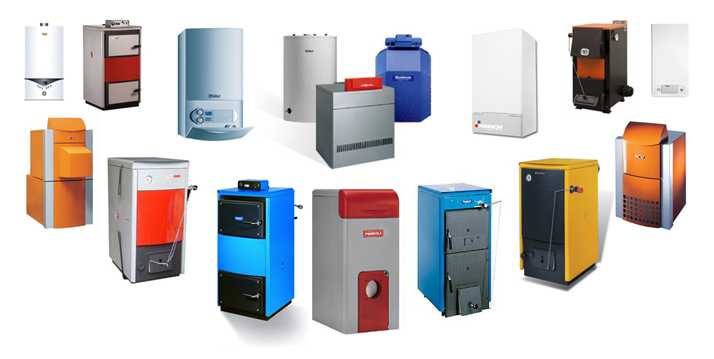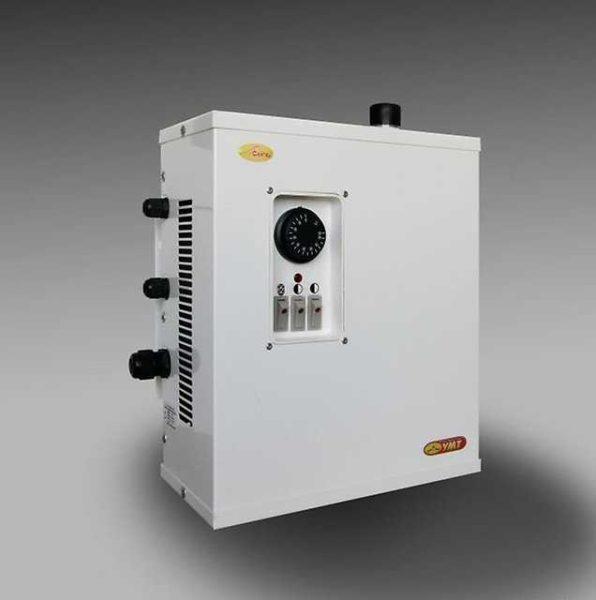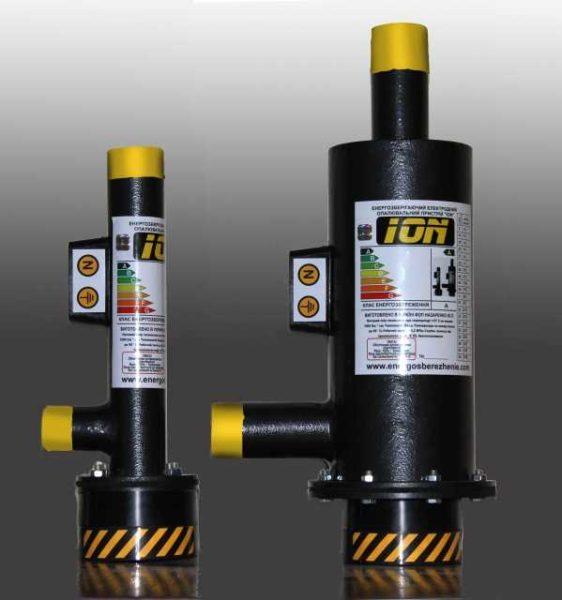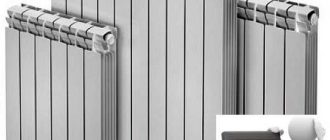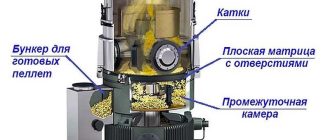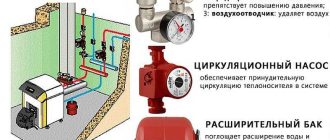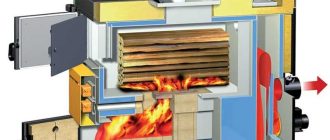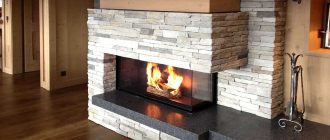To choose a boiler for heating a private house you need to take into account many factors. To do this, it is necessary to have information about the main features of each type of boiler, their advantages and disadvantages.
Treść artykułu
How to choose a boiler for a house
When choosing a heating boiler, you need to consider several factors at once. The first – what kind of fuel in your region is the most affordable. It means not only the price, but also the availability of this type of fuel in warehouses or the possibility of its extraction / purchase without special problems.
The second thing to pay attention to is the possibility of autonomous operation. If there is someone in the house all the time, this point can be omitted. But if during the working week everyone is at work or studying, it is better if the boiler for heating a private house can work for a long time without human intervention.
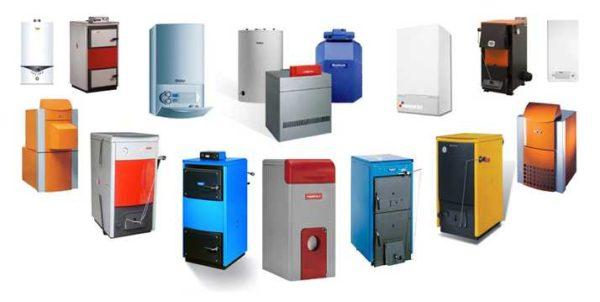
The third factor is the convenience of use and the need for maintenance. Not everyone and not always want to regularly visit the heating boiler. In this case, it is better to take the most automated version. Yes, they cost more, but they require minimal maintenance. About maintenance – some fuels require regular cleaning – combustion chambers or burners. If you are not happy with this aspect – it is worth choosing a boiler that needs minimal maintenance. These are, by the way, units operating on gas and electricity.
If there is gas
If there is a gas main near the house, it makes sense to consider buying a gas boiler. At the moment, gas heating is the cheapest in most regions. At the same time, gas heating boilers are autonomous – you can stay away from them for weeks, practically do not require preventive maintenance. The only disadvantage of such a solution – a considerable amount of money in which it costs to connect to the main line.

Rodzaje kotłów gazowych
According to the type of location of gas heating boilers are wall-mounted and floor standing. The maximum capacity of wall-mounted variants is 60 kW, floor units there are also 100 kW and more. In addition, some models can work in a cascade. What are good wall-mounted gas boilers? The fact that they can be mounted in the kitchen, the more so that the design is suitable for the kitchen design.
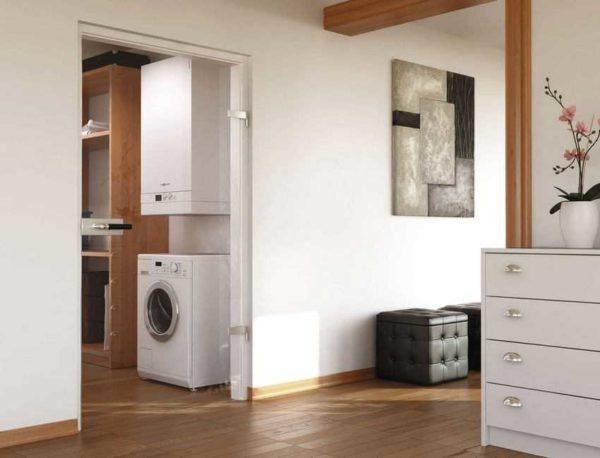
Under the installation of a gas floor standing boiler with a capacity of more than 60 kW requires a separate room. It can be a room in the house or an annex with a separate entrance – a boiler room. About the requirements for such rooms for the installation of a gas boiler read here.
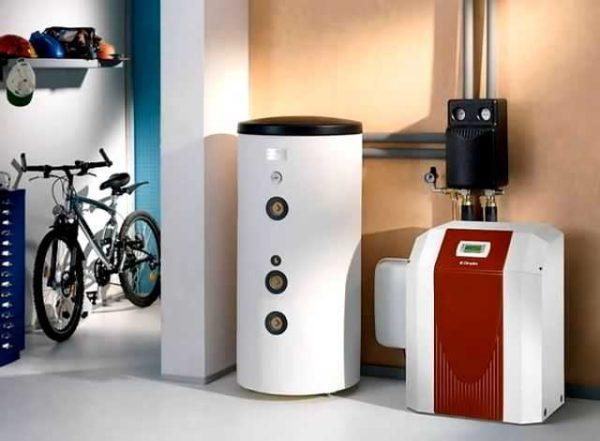
You can install a gas boiler even if there is no mains, but there is an opportunity to buy liquefied gas. In this option put a floor gas boiler with a burner that can work with liquefied gas (usually requires readjustment). About the cost-effectiveness of such heating is difficult to say at once: it is necessary to calculate how much it costs 1 kW of heat when using available fuel options. Based on the results of calculations to draw conclusions.
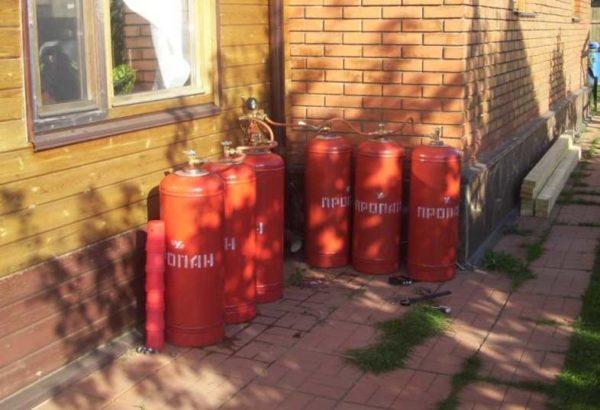
Types of burners
In wall-mounted gas boilers can be installed burners of two types – atmospheric (open) and turbo (closed). Atmospheric burners require a chimney with a good draft, turbine burners are connected to a coaxial chimney, which can be led directly through the wall near the boiler.
These combustion chambers also differ in the way the combustion air is extracted. In open burners, the air is taken from the room, so in such rooms must be equipped with a supply ventilation of sufficient capacity. In closed combustion chambers, oxygen is supplied through one of the coaxial chimney pipes. Therefore, there are no special requirements for ventilation. But turbine boilers have their own disadvantages: the chimney led into the wall can be overgrown with frost, snow, etc. In this case, the boiler does not turn on.
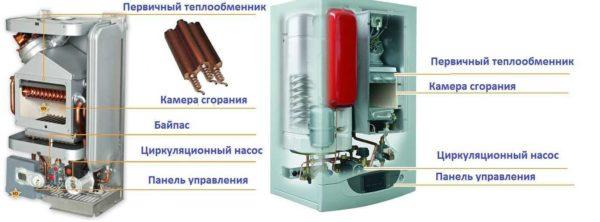
When choosing a gas boiler, it is also worth paying attention to the number of positions in which the gas burner can work. There are three modifications:
- Single-stage. There are only two modes of operation – at full power and off. The cheapest burners, but gas consumption is the largest, that is, in operation such boilers are not economical.
- Two-stage. There are two modes of operation – at 100% power and at 50%. The third position is off. These burners are already more economical, with them it is easier to maintain the set temperature.
- Modulated. The most expensive, but also the most economical burners. Depending on the need, they can be turned on both at full power and at 10%, and the regulation is smooth.
It is clear that in the long term better boiler for heating a private house with a modulating burner. They are more expensive when buying, but more economical during operation.
Condensing gas boilers
Above we talked about traditional gas boilers for heating a private house. They are also called high-temperature, because at the output they give out a coolant with a temperature of 45-50 ° C and above. Such units are ideal for working with radiator heating.
Condensing boilers are characterized by the fact that they are effective when working in low-temperature mode – with a temperature in the return pipe no higher than +40°C. In this case, gas is used most economically – due to condensation of vapors contained in the flue gas, more heat is transferred, which leads to a significant reduction in gas consumption.
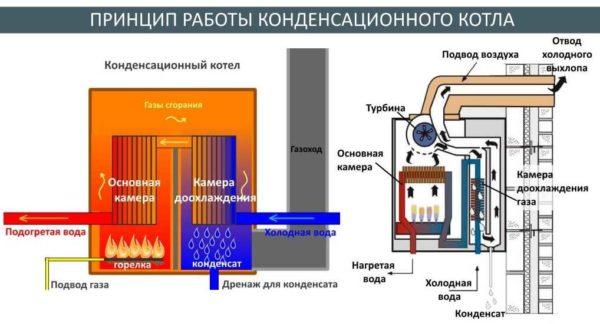
This feature of condensing boilers makes them ideal when heating a house with warm water floors. This boiler for heating a private house can produce at the output of the coolant of +35°C, in the return will be a temperature of about +30°C. Due to this heating will be economical.
But, as usual, without disadvantages did not do without. The first one is that the condensate formed is very corrosive. Therefore, the chimney should only be made of stainless steel, and of high quality. The second disadvantage – the price of condensing boilers is higher than traditional boilers of the same capacity. This is due to a more complex scheme and the fact that the materials used are resistant to the effects of condensate.
On electricity
If there is a technical possibility (allocated a significant number of kilowatts), you can put an electric boiler for heating a private house. In terms of simplicity of operation, these are better units. If there is electricity, they work in a preset mode, are practically silent, do not require maintenance. Their main disadvantage is the large amounts that you have to pay for heating.
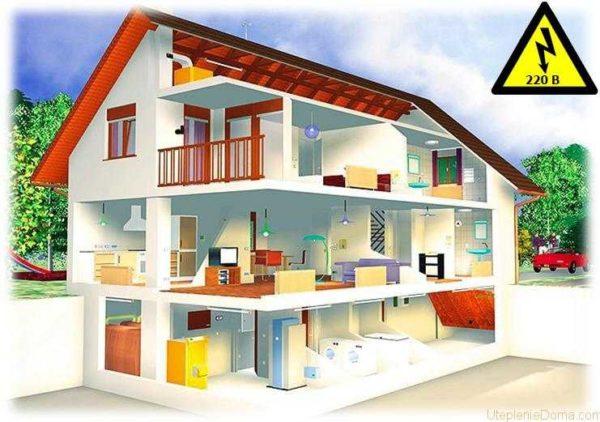
Types of electric boilers
Today there are electric boilers for heating a private house of three types:
- On TENS. The most common and familiar type of electric boilers. More economical in operation are units that can operate in several power modes (multistage). Disadvantages – rather low efficiency – due to heating losses of the heating elements themselves. Dignity – simple repair and relatively inexpensive consumables (TENS).
- Induction. These boilers use the release of heat at the occurrence of electromagnetic induction. In such electric boilers, water is heated by passing through an inductive coil. Sellers (and owners of such boilers) say that such installations are more economical than TEN – there are no losses for heating TENS, there is practically no inertia. To the pluses of such boilers can be attributed their small size. They are a small piece of pipe – length from 35 cm to a meter and something (depending on the power). The disadvantage of such equipment – in the absence of coolant flow, the induction boiler very quickly overheats and burns.
- Electrode. This type of boilers for heating a private house is the least popular, although it is also positioned as more economical. The whole point is that in the pipes must circulate electrolyte – water with certain electrical characteristics. This is necessary because the coolant is heated due to heat generation when the current passes between two electrodes. The device is simple, but requires control over the condition of the coolant and electrodes. Does not add to the popularity of the fact that the actual heating system is energized.
In general, if you are thinking of putting an electric boiler for heating a private house, choose between the traditional TEN or induction.
A way to make heating cheaper
If there are multi-zone tariffs in the region and installed two-tariff electric meter, the use of an electric boiler for heating the house can be made not so expensive. To do this, put in the system heat accumulator of large capacity. Water in it is heated during the night, the lower tariff. During the day, during the high tariff, the boiler is switched off and the temperature is maintained by transferring the heat stored in the accumulator.
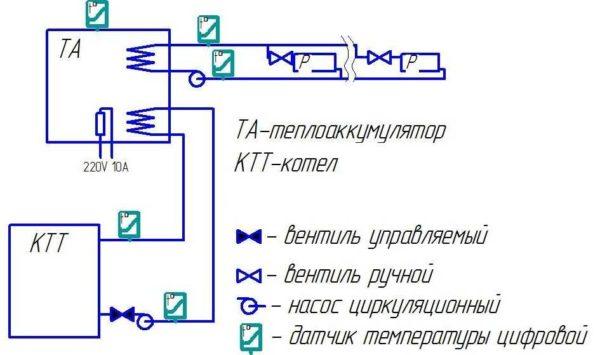
Solid fuel boilers
Despite all the disadvantages, solid fuel boilers for heating a private house are used in most cases. Probably largely due to habit and tradition, but the fact remains – solid fuel boilers in our country are installed more than all other boilers.
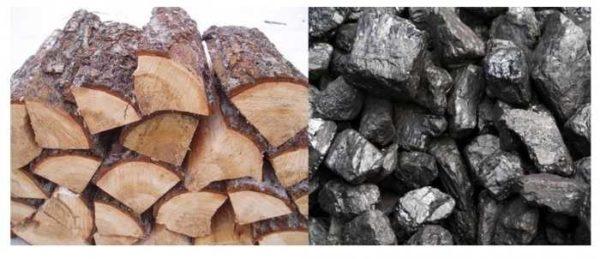
Basically for heating use two types of solid fuel – wood and coal. What is easier to get and cheaper to buy, and that is mostly used. And boilers – for coal and wood should be used different: in wood solid fuel boilers loading chamber make a larger volume – to be able to lay more wood. In coal-fired TT boilers, the furnace is made smaller, but with thicker walls: the temperature of combustion is very high.
Plusy i minusy
To the advantages of these units can be attributed:
- Inexpensive (relatively) heating.
- Simple and reliable design of boilers.
- There are energy-independent models that work without electricity.
The disadvantages are serious:
If we talk in general, then the use of a solid fuel boiler for heating a private house is an inconvenient solution. Although the purchase of fuel, as a rule, costs relatively inexpensive, but if you count more time costs, it is not so cheap comes out.
Long burning boilers
To increase the interval between fuel deposits were developed long burning boilers. They use two technologies:
How efficient are these technologies? Quite efficient. Depending on the design, one laying of wood can burn from 6-8 to 24 hours, and coal – from 10-12 hours to several days. But to get such a result it is necessary to use high quality fuel. Both firewood and coal must be dry. This is the basic requirement. When using wet fuel, the boiler may not even enter the smoldering mode, that is, it will not start to heat. If you have a woodpile with a two-three-year supply of firewood or a large shed in which coal is stored, a long-burning boiler for heating a private house – a good choice. Better than a conventional one.
Liquid fuel
Heating boilers for a private house on liquid fuel are the least common. There are too many disadvantages of this type of heating:
In general, a liquid fuel boiler for heating a private house makes sense to put, if you have a free (or almost) source of fuel. In all other options, it is better to use other heating equipment.
Pellet boilers
Boilers operating on pellets are difficult to attribute to any class, because they are usually talked about separately. Fuel for this type of boilers – small-sized pellets of compressed sawdust. To store pellets near the boiler make a hopper. Its size determines the autonomous operation time of the equipment. If there is enough space, the hopper can be made for several tons of fuel. The minimum size – a couple of buckets, which is enough for a day of work.
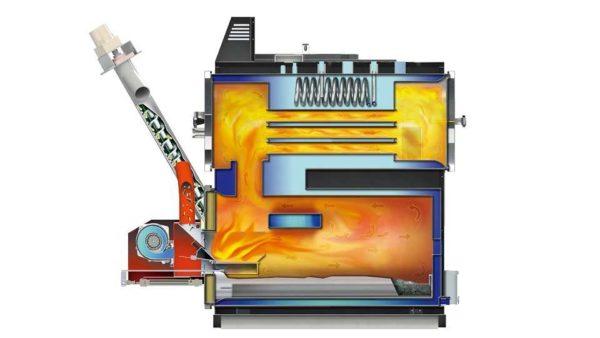
Pellet heating boiler is equipped with a special burner. Pellets from the hopper are automatically fed into the combustion zone, where they burn almost without residue. Normal quality pellets give only 3-5% of ash. Therefore, cleaning is rarely required – once a week or even once every few weeks. The equipment is fully automated, with a sufficient supply of fuel you can not visit for weeks.
But even here is not without disadvantages. The first is the high price of the equipment. The second is the demanding quality of pellets. They should have low ash content, good calorific value, should not break and crumble. Otherwise, the pellet boiler for heating a private house is a good choice. Its plus is also in the fact that woodworking industry waste is used.
Combined boilers
There is also such a modification of heating boilers, as combined heating devices. The most popular option is a solid fuel boiler with several electric heaters. Such units while burning wood or coal work as TT equipment, when the fire is extinguished, the boiler cools slightly, the electric part is turned on. Fully heat the house TENs in this case are not able to, but they can support the system. That is, the house will not be cold in the morning. Yes, and in the case of a long absence of TENs will not let the system freeze.
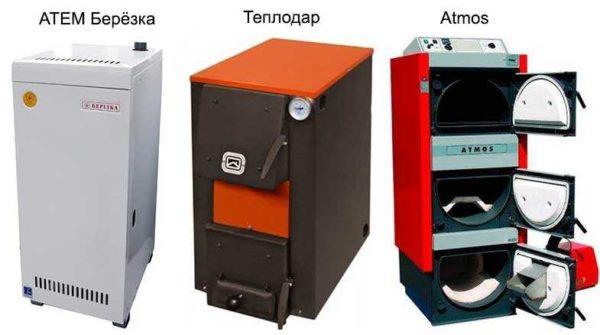
Another popular option – combined boilers TT with liquid-fuel burners. In such units there are two separate combustion chambers. One under solid fuel, the second – under the burner with liquid fuel.
The advantages of such boilers are obvious: you can use several types of fuel. The disadvantage is a high price and average efficiency – the efficiency of each of the parts is not too high. So the combined boiler for heating a private house – a controversial decision.
So how to still choose a boiler for heating a private house
To make it easier to navigate when choosing, let’s systematize the information. Consider the most typical requirements that affect the choice of the type of boiler:
If you take into account the availability and accessibility of fuel, it is not difficult to make your choice.

